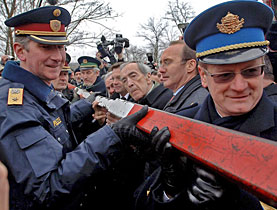Approaching a Switzerland without borders

Experts from the European Union member states have voted in favour of ratifying an accord with Switzerland to allow it to join the Schengen Area later this year.
Meeting in Brussels on Tuesday, the EU’s Efta Group cleared the way for Switzerland to become part of the border-free zone from November 1.
The accord could be signed as early as the end of January and come into force one month later.
In Switzerland the necessary technical and legal changes will be addressed and airport infrastructure evaluated to make sure everything is in line with Schengen rules.
Switzerland will have to pay into a special Schengen fund set up by Brussels. This is estimated to be about SFr13 million ($11.3 million).
Switzerland, which is not a member of the EU, was initially scheduled to join the Schengen zone last year but there were delays in the parliamentary ratification process in a few EU countries.
Swiss voters approved the Schengen treaty in a nationwide vote three years ago.
If everything goes according to plan, Switzerland will become part of the passport-free travel zone nearly one year after many eastern European members joined Schengen, including Poland, Hungary, the Czech Republic, Slovakia and the Baltic states.
In a letter sent last week to the EU, Swiss Foreign Minister Micheline Calmy-Rey linked the issue of Schengen ratification with additional Swiss financial contributions to the latest EU member states.
Positive step
Calmy-Rey said ratification of an accord admitting Switzerland to Schengen would be a “positive step” in connection with the EU’s request that Switzerland provide Romania and Bulgaria with around SFr300 million ($275 million) in aid.
This comes on top of SFr1 billion earmarked for the other eight EU states in central and eastern Europe as well as Cyprus and Malta.
“It is Switzerland’s intention to decide on an enlargement contribution for Bulgaria and Romania.” Calmy-Rey wrote. But she said this would “follow the conclusion of negotiations on the extension of an accord on the free movement of people to both countries”.
Until now, neither of these two governments has been willing to agree to the terms presented by Switzerland.
Bern has asked for the inclusion of an escape clause to ensure the country is not overrun with Bulgarian and Romanian job seekers once the free movement accord comes into effect. Depending on the modalities of the accord, this could be in 2013.
In another development, the Efta Group approved a mandate for the EU Commission to begin negotiations with Switzerland on education issues.
The aim is to allow Switzerland to participate as an equal partner in education and youth programmes.
swissinfo with agencies
The Schengen Area comprises 24 countries, most of which are members of the EU, as well as the four member countries of the European Free Trade Asssociation – Iceland, Norway, Switzerland and Liechtenstein.
Britain and Ireland are not in the zone, but they have signed up to agreements on security.
A key element of the Schengen agreement is the Schengen Information Service (SIS), which includes a huge database in the French city of Strasbourg.
The SIS database enables police in any Schengen state to find out whether a suspect has been involved in any kind of crime across the EU.
The Schengen treaty takes its name from a town in Luxembourg where it was signed by Germany, France and the Benelux states in 1985.

In compliance with the JTI standards
More: SWI swissinfo.ch certified by the Journalism Trust Initiative











You can find an overview of ongoing debates with our journalists here . Please join us!
If you want to start a conversation about a topic raised in this article or want to report factual errors, email us at english@swissinfo.ch.